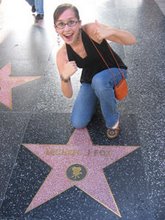ABC's highly-anticipated new cerebral drama Flashforward premiered last night, starring Joseph Fiennes and John Cho. And some people from Lost and Coupling? And Gabrielle Union? The pilot was likely an unfortunate sign of things to come, that is, a mediocre execution of a story with an impressive conceit. For those of you who've missed the omnipresent advertising, the show takes place in the aftermath of a worldwide blackout during which every human alive had a 2 minute and 17 second vision of what they will be doing exactly six months into the future (ahem...during sweeps week). This raises the obvious questions of how and why this happened, and the more philosophical ones of what people do when they know the future -- if they can change or prevent what they saw, and if they should try.
I'd read before watching the show that the initially catastrophic results of the blackout - traffic collisions, plane crashes, medical emergencies - would be quickly glossed over before the lead characters (FBI agents stationed in L.A.) embarked on their investigation of the event. This was a mistake, I feel, because that could have been an incredibly exciting idea to explore for a couple of episodes. Of course, Flashforward is often compared to Lost, whose pilot did have all of the excitement that last night's episode lacked, but I would point to Jericho as an example of a cataclysmic tale which started out with a bang and then was canceled in such short order that it didn't have the time to stick to the pacing its premise needed. With a built-in six month time period before we arrive at a conclusion we've seen already, I worry that the show will be rushed, like later-season Alias.
A coworker and I were discussing the show, and agreed that the writing was disappointing given the intriguing concept. There was a lot of exposition, and the characters didn't react to the phenomenon in a very realistic way. Among a group of a dozen or so FBI agents, about half recalled noticing the date on a calendar or newspaper or something in their vision. Do you think that 50% of the population is observing the date at any given time? It just felt odd that everyone would figure out and then accept the fact that they'd glimpsed the future. Wouldn't the leading assumption be more to do with a chemical terrorist attack and a communal hallucination?
I will say that, at the end of the episode, when one character glimpses a clue while researching security footage, I was genuinely chilled by the creepy scene. It was enough to keep me watching for a few episodes, because I do want to know the "answer" to the show's question, but I hope the writing improves so I don't stop caring halfway through the season like I did with Fringe.
Of course, the other obvious question to ask about the show has to do with what happens after the big "reveal" in April? Surely the creators have planned what a potential second or third season would deal with. My coworker's astute guess is that they will have another flashforward, and I think this is the most logical answer. For some reason, this all just makes me want to go back and watch The 4400 again. They have exceedingly different premises, but man was that show good.
Flashforward airs Thursday nights on ABC at 8pm.
Friday, September 25, 2009
Subscribe to:
Post Comments (Atom)




No comments:
Post a Comment